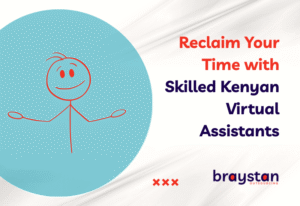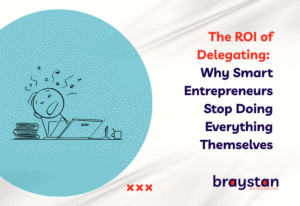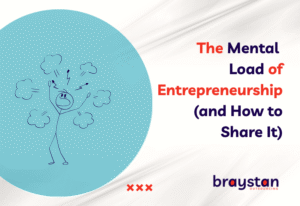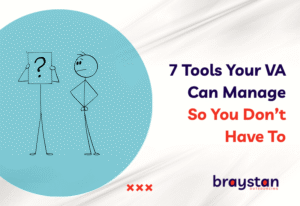Entrepreneurship is often glamorized as freedom, flexibility, and financial independence. But behind the highlight reels, many founders quietly carry something less visible: the mental load of entrepreneurship.
This isn’t just about doing tasks—it’s about constantly thinking about them. The invoices you need to send, the social media posts you haven’t scheduled, the client follow-up waiting in your inbox, the new marketing idea you’re juggling in the back of your mind. The mental load is the weight of invisible work, and if left unchecked, it can lead to burnout, decision fatigue, and slower business growth.
The good news? You don’t have to carry it alone. By learning to recognize the mental load of entrepreneurship and sharing it effectively, you can reclaim your time and energy for the work that truly matters.
What Is the Mental Load of Entrepreneurship?
The term mental load originally gained traction in conversations about household and family responsibilities, describing the invisible labor of keeping track of what needs to be done. In business, the same concept applies.
The mental load of entrepreneurship is the ongoing, invisible management of tasks, plans, and decisions required to keep your business running. Unlike the actual tasks themselves, the mental load is about holding everything in your head:
- Remembering deadlines
- Anticipating client needs
- Tracking progress across multiple projects
- Worrying about missed opportunities
- Carrying the “what ifs” of business decisions
This constant cognitive burden makes it hard to truly rest, even when you’re technically “off the clock.” And for entrepreneurs, where business and personal life often blend, the load can feel never-ending.
According to the American Psychological Association, ongoing mental strain significantly increases stress and reduces productivity. For entrepreneurs, this doesn’t just impact health—it impacts revenue.
Signs You’re Carrying Too Much Mental Load
Many entrepreneurs normalize this pressure because they assume “it comes with the territory.” But there are clear warning signs that the mental load of entrepreneurship is taking a toll:
- You wake up at night thinking about tasks.
- You find it difficult to switch off, even during personal time.
- You procrastinate because your brain feels too cluttered.
- You’re constantly multitasking but never feel caught up.
- You know you need help but don’t have time to ask for it.
If any of these sound familiar, your mental load isn’t just heavy—it’s unsustainable.
Why Sharing the Mental Load Matters
Entrepreneurship thrives on creativity, strategy, and vision. But when your mental energy is spent on remembering small details, there’s little left for growth-focused work.
Sharing the mental load of entrepreneurship offers three major benefits:
- Better decision-making: With less noise in your head, you think more clearly.
- Sustainable energy: You reduce stress and avoid burnout, keeping your passion alive.
- Faster growth: When routine tasks are shared, you have more bandwidth for scaling your business.
This is why successful entrepreneurs rarely go it alone. They build support systems that help them carry the invisible weight.
Practical Ways to Share the Mental Load of Entrepreneurship
So, how do you actually share something that feels so intangible? Here are practical strategies:
1. Document and Delegate
The first step is getting your mental load out of your head and into a system. Write down recurring tasks, deadlines, and processes. Then, delegate them.
For example, instead of remembering to schedule newsletters each month, create a checklist and hand it to a virtual assistant (VA). At Braystan, we support entrepreneurs by taking over repetitive tasks like inbox management, scheduling, and customer support—freeing your mental space.
2. Use Tools to Externalize the Load
Digital tools act as an external brain. Project management apps like Trello, Asana, or ClickUp help you track tasks without keeping them all in your head. Calendar reminders can take the place of mental reminders.
The trick isn’t to work harder—it’s to stop relying solely on memory.
3. Build a Trusted Support Team
Sharing the mental load of entrepreneurship isn’t just about outsourcing tasks—it’s about building trust. Whether with a VA, business partner, or operations manager, the goal is to have someone who can anticipate needs without you micromanaging.
Trust is built over time, but once established, it’s transformational. Imagine not having to wonder if invoices were sent or social media posts scheduled—it’s already handled.
4. Set Boundaries for Mental Rest
Delegation only works if you allow yourself to mentally step back. That means setting boundaries:
- No work emails after 8 p.m.
- Weekly digital detoxes
- Time-blocking for personal activities
Rest isn’t laziness—it’s maintenance for the entrepreneurial mind.
5. Focus on High-Value Work
Every entrepreneur has a “zone of genius”—the unique work only you can do. The rest can be shared. By freeing yourself from carrying the mental load of small tasks, you can spend more time on innovation, partnerships, and client strategy—the things that drive growth.
The Role of Virtual Assistants in Sharing the Mental Load
Virtual assistants are uniquely positioned to help entrepreneurs manage the mental load. Unlike hiring full-time staff, VAs provide flexible, cost-effective support tailored to your needs.
A skilled VA can:
- Manage your calendar and inbox
- Handle customer communication
- Update your website or e-commerce store
- Prepare reports and spreadsheets
- Coordinate with vendors and clients
For many entrepreneurs, this shift is life-changing. Instead of carrying invisible tasks around all day, you can trust that someone else is tracking and handling them.
(Internal link suggestion: Link to “How to Delegate: Overcoming the Top 5 Excuses” blog.)
Real-World Perspective: Why Entrepreneurs Struggle to Share the Load
Despite the benefits, many entrepreneurs resist sharing their mental load. Common reasons include:
- “It’s faster if I just do it myself.”
- “No one else will do it as well as I can.”
- “I can’t afford help yet.”
But as productivity expert David Allen (author of Getting Things Done) emphasizes, your mind is for having ideas, not holding them. By insisting on carrying everything yourself, you slow your own progress.
Lighten the Load, Grow the Business
The mental load of entrepreneurship is real, heavy, and often invisible. But it doesn’t have to stay that way. By documenting your tasks, leveraging tools, delegating to trusted partners, and setting boundaries, you can share the load effectively.
Remember, your business doesn’t just need your effort—it needs your vision. And vision thrives in a clear, focused mind.
If you’re ready to lighten the mental load and reclaim your energy, explore how Braystan’s virtual assistant support can help you manage the invisible work of entrepreneurship. Because the best businesses are built not on overwork, but on shared strength.







